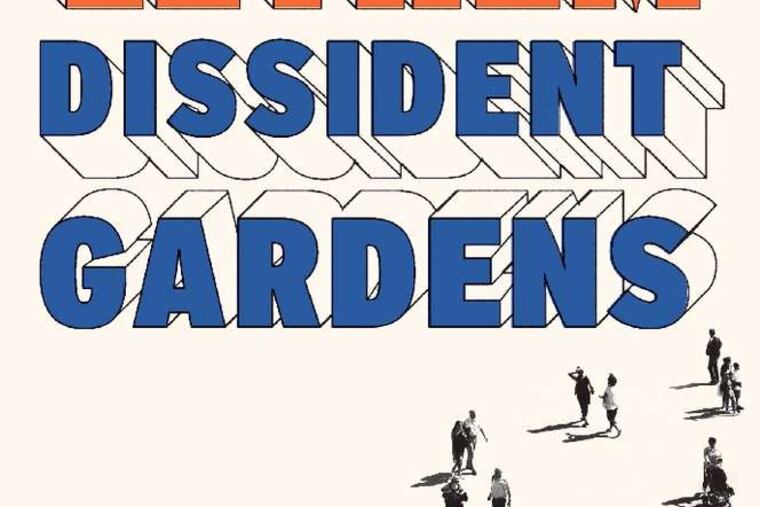Wide-ranging saga of American left
From his early, playful pastiches through ambitious works like The Fortress of Solitude (2003) and Chronic City (2009), the self-referential meta-theme in every Jonathan Lethem novel has been why we tell stories - and what the narratives we write or endorse say about who we are.

Dissident Gardens
By Jonathan Lethem
Doubleday. 384 pp. $27.95
nolead ends nolead begins
Reviewed by Mike Fischer
From his early, playful pastiches through ambitious works like The Fortress of Solitude (2003) and Chronic City (2009), the self-referential meta-theme in every Jonathan Lethem novel has been why we tell stories - and what the narratives we write or endorse say about who we are.
Given that Lethem spent part of his childhood in a commune, it was therefore probably inevitable that he'd eventually explore one of the most seductive narratives of the last century: the Communist Party's once bright and shining vision of solidarity forever.
But as its pluralized title suggests, the wide-ranging Dissident Gardens gives us much more: not just the Eden for which the Old Left fought in 1930s America, but a multigenerational saga encompassing the utopian gardens to come, from the New Left's flower power to the Occupy movement's World Without Wall Street.
In the beginning, Lethem creates Rose Zimmer - die-hard Communist, imposing matriarch of Queens' Sunnyside Gardens apartment complex, and mother to Miriam.
Rose preaches love, but is filled with hate; having "dedicated herself" to helping humanity overcome "the false divisions our notions of race and creed had imposed," she marches toward a "disastrous" and increasingly total "estrangement" from the very people she wants to help.
"The true Communist," Rose reflects at one point, "always ends up alone," retreating into a fortress of solitude - a "cell of one," as Lethem puts it, in which one tries to preserve the purity of one's story by growing "radiant with disapproval."
Despite her stylistic differences with Rose, Miriam - a pot-smoking, commune-living yippie who champions causes ranging from the homeless to Third World revolutions - is her mother's daughter. She rejects her parents much as they had once rejected their own, insisting they're "not seeing the present world for what it is."
Ditto Lethem's other main characters, all of whom come to define themselves by what they're not - true to form in a country where oppositional politics, going all the way back to Anne Hutchinson, have featured a fiercely individualistic withdrawal from the very world one claims to engage.
There's Cicero: a black, gay, and angry cultural theorist whose policeman father had slept with Rose for much of a decade. Sergius: Miriam's son and sometime Quaker, whose solipsistic identity politics reduce opposition to a lifestyle choice. And Lenny: Rose's eccentric second cousin, whose Marxism leaves room for Groucho as well as Karl.
In telling their stories, Lethem not only gives us a full-blown history of the American left, but he also writes well about a breathtaking array of topics.
Parents and children. Race in America. Baseball, with an emphasis on the New York Mets. Bob Dylan, folk music and populism. What it means to be Jewish. Abraham Lincoln. Archie Bunker. Religion in American life. Feminism's often troubled relationship with radicalism. Nicaragua. The enduring, disheartening aftermath of Sept. 11, 2001.
Most of this material and all of Lethem's characters are swaddled in his characteristically dense, allusive, metaphor-rich prose. Lethem's dazzling conceits - a childhood home as field hospital, a New Jersey chicken farm as an embodiment of the Popular Front, and Quakerism's Inner Light as a stove's pilot light, to name three - are the stuff of great poetry, of the 17th-century variety.
But for all their glitter, Lethem's razor-sharp images and characters can be as cold as a distant star - or, to invert this novel's chess metaphor, pawns in Lethem's own master narrative. Advancing Lethem's central thesis, they often exist as ideas rather than people; their relation to those ideas can be more compelling and credible than their relations with each other.
Lethem might respond by insisting that what I'm describing as a flaw is just another variation of his central theme: how readily we lose touch with the personal base as we fixate on the political superstructure. Dissident Gardens is so smart - and so beautifully crafted - that I'd be tempted to believe.